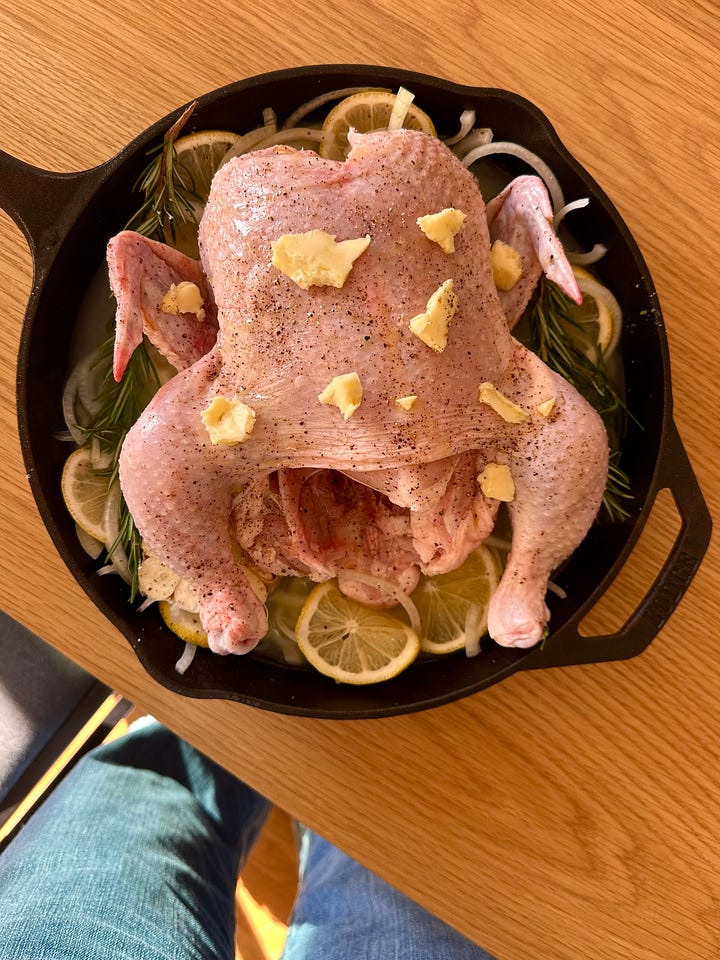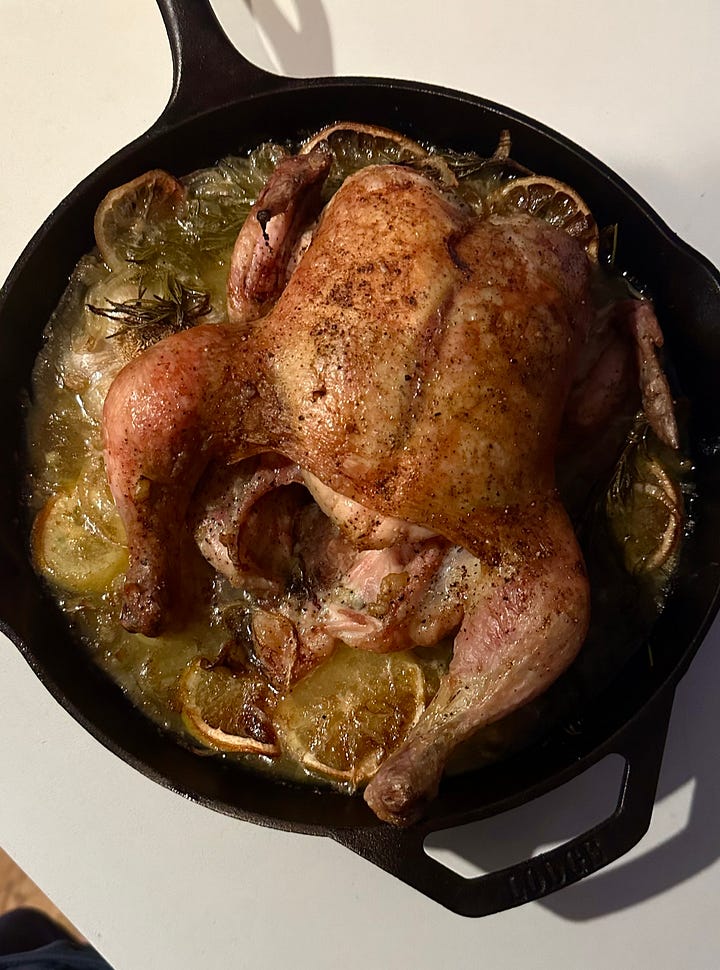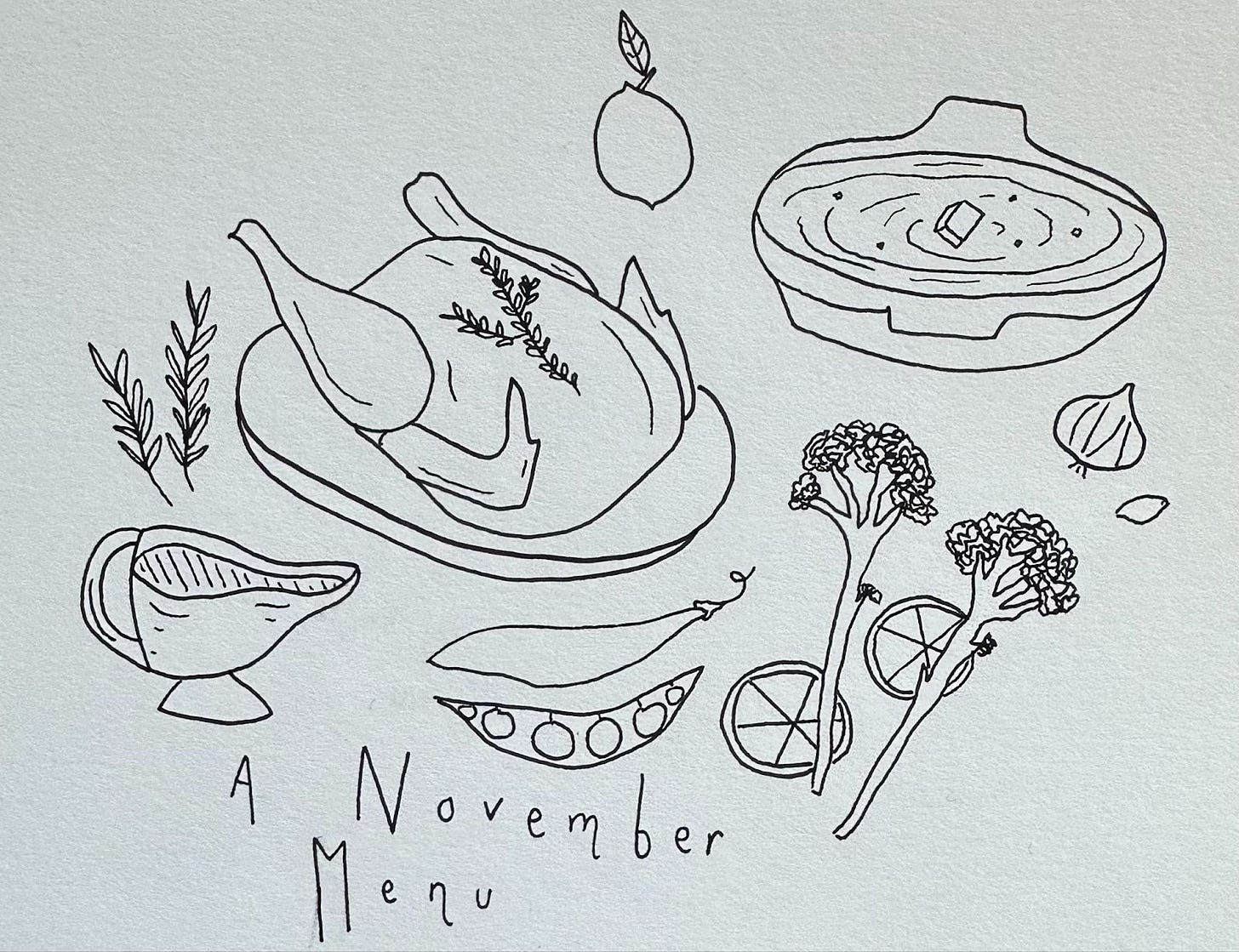A November Menu
Love is a durable stance / Low-and-slow roast chicken is a good idea
I’d like to begin by sending love to everyone struggling right now in the wake of the election. I see you; I’m with you. I’d also like to share a few words from a former teacher of mine, Mr. Belsky — words that his daughter, Molly, shared with me back in 2016: “Focus on the people around you. Love is a durable stance.” Those words helped me enormously back in 2016, and now I’m once again repeating them to myself. I’m not sure how to proceed, but I know that there are people in my community today who need my support as much as I need theirs, and I know in my core that love is a durable stance.
With that, here are some words I wrote last week about low-and-slow roast chicken — a healing thing. (Roast chicken is always comforting, but it feels especially restorative when the sun sets at 4:30 and you’re, well, grappling with the painful realities of your country!)
Same boat? This might be worth making.
My primary goal as a recipe developer is never to reinvent the wheel. It is, rather, to propose ideas, clarify confusion, and share the pleasures of cooking. Today’s menu certainly doesn’t reinvent the wheel, and it is one that I can recount in a single breath: roast chicken, gravy, mashed potatoes, and something green. A pared-down Sunday roast to eat with people you love.
Roast chicken is the center of this meal, and let me just say: food writers love to tell you that roasting a chicken is the easiest thing in the world to do. Food writers also love to offer conflicting advice on the best way to do it. You simply must brine the bird for 48 hours or truss it in this way or stuff it with whatnot and use this herb or that herb, and the temperature must be at 300 or 350 or 400 or 425 or hotter or cooler — that is, assuming you want your roast chicken to be perfect.
So, yes, I’ve been confused about how to roast a chicken since I first learned to cook.
Today, I’m pleased to report that I’ve finally figured out my go-to roast chicken, and that I’m stepping off the food media hamster wheel of new roast chicken recipes. I’m not going to write out a long recipe, chock-full of opinions, and confuse you further, but I will explain the technique I’ve discovered that works for me. I’ll also provide a few suggestions to round out the meal without demanding that you make anything one particular way. This is a choose-your-own-adventure Sunday roast, designed to soothe.
Low-and-slow roast chicken
Preheat the oven to 300℉. Season a 3½-4 pound chicken all over and generously with salt and black pepper, and give it a rub. Transfer to a baking dish like a cast iron skillet. Surround with aromatics — maybe some rosemary or thyme or lemon or onion or garlic (whatever you have) — and pour in a cup of chicken broth. Drizzle the chicken with olive oil or dot it with butter, then transfer to the oven and cook for 3 hours. Around every hour, baste the chicken, which simply means spooning liquid from the bottom of the baking dish onto the meat.
That’s it. Meltingly tender meat and surprisingly crisp skin given the low temperature.


Gravy
I don’t like the pressure of making gravy in the spur of the moment with the fat drippings that result from roasting a bird. I’d much rather make it in advance, perhaps while the bird is roasting. My formula: 1 tablespoon butter, 1 tablespoon flour, 1 cup chicken broth. Scale up as needed.
Melt the butter in a saucepan and sprinkle in the flour to make a roux (thickening agent). Stir and cook for a couple minutes, then gradually pour in the chicken broth, whisking as you go. Keep cooking and whisking until the gravy is smooth and nicely thickened. Remove from the heat and season to taste with salt and pepper. You might also want a dash of lemon juice for acidity or soy sauce for umami.
Mashed potatoes
Yukon Golds are my preference for mashed potatoes for a couple reasons. First, their texture is naturally buttery and creamy, and second, they’re thin-skinned enough that you don’t need to peel them. Just wash and quarter the Yukon Golds, then boil them in a pot of salted water. When they’re tender, drain the potatoes and return them to the pot. Mash them with whatever implement is close at hand, and don’t forget to add dairy (potatoes love dairy!). Always butter, perhaps a splash of milk or cream, and a scoop of sour cream or crème fraîche if you have some around. Season to taste with salt and pepper. (And of course fresh chives are always welcome.)
Something green
For health and color! A few of my go-to green things:
Frozen peas, boiled, drained, and tossed with butter and fresh mint
Broccolini, roasted at high heat until tender and charred
Leeks, thinly sliced and sautéed until soft and sweet
Hardy greens like kale, braised in chicken stock
I’m wary of the words “perfect” and “best” in food writing. While they’re seductive terms that I’ve relied on frequently in my work, they’re rarely honest and provide little practical value. As a cook, writer, and human, I’m always striving to 1) show up and 2) make something good. I’m less interested in whether or not you think my roast chicken is the best roast chicken, and much more interested in presence, quality, and honesty.

Thank you so much for being here week after week and supporting my writing (and cooking).
With love,
Phoebe






Love the sanity I find with you. Bring it on.
No need to reinvent the wheel with that one x